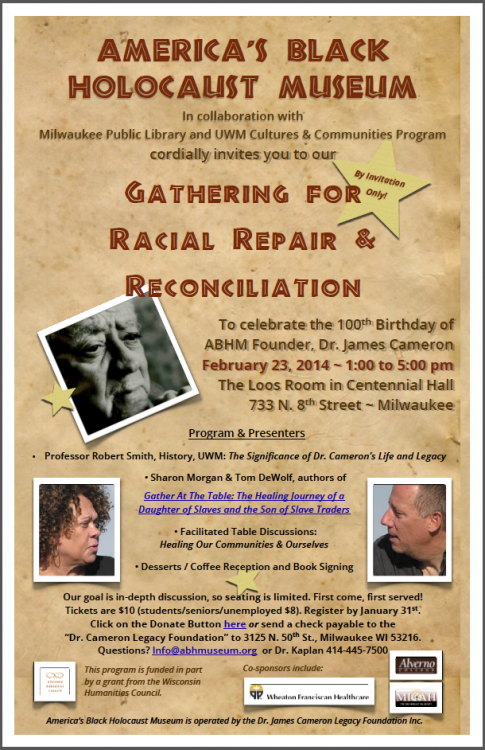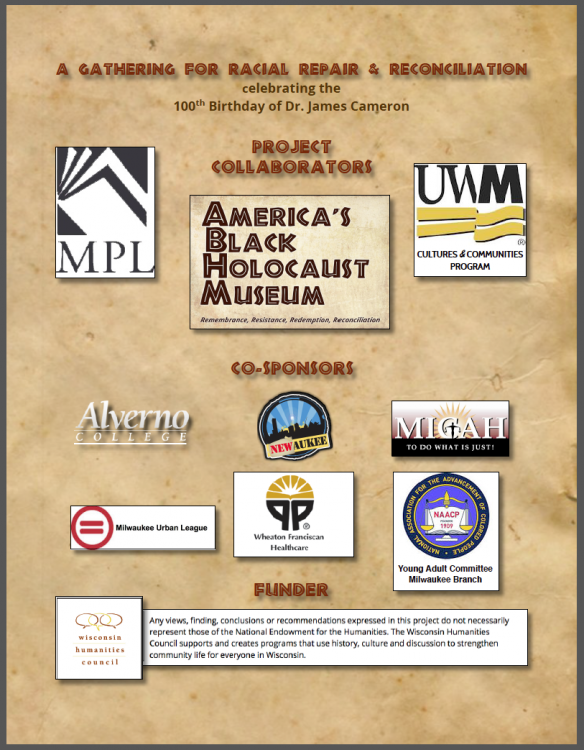The 2014 Founder's Day Gathering for Racial Repair and Reconciliation – Live!
Share
Breaking News!
Today's news and culture by Black and other reporters in the Black and mainstream media.
Ways to Support ABHM?
Scholar-Griots: Thomas DeWolf, Dr. Fran Kaplan, Reggie Jackson, Sharon Morgan, and Dr. Robert S. Smith
Videos: Produced and Directed by Brad Pruitt, ABHM Community Engagement Coordinator, with Jenny Plevin and the Students of doc/UWM, Videography and Editing
Setting the Stage
 On February 23, 2014, America's Black Holocaust Museum (ABHM) honored the 100th Birthday of its founder, Dr. James Cameron, with a Gathering for Racial Repair and Reconciliation.
On February 23, 2014, America's Black Holocaust Museum (ABHM) honored the 100th Birthday of its founder, Dr. James Cameron, with a Gathering for Racial Repair and Reconciliation.
Our Gathering brought together 125 community leaders of diverse backgrounds, primarily from Milwaukee, Wisconsin, the most hyper-segregated metropolitan area in the US and home to the original ABHM. The celebration also marks the second anniversary of the rebirth of ABHM as a virtual museum after the closure of its physical facility in 2008.
Participants in the afternoon event listened to presentations about the significance of Dr. Cameron's life and legacy, ABHM's place in the city and the world, and the journey of discovery and healing undertaken by a daughter of slavery and a son of the slave trade.
Following the presentations, participants engaged in small group discussions about what racial repair and reconciliation would look like in our city and how we might get there. The afternoon ended with birthday cake and a book signing – and a promise by ABHM to keep the discussion going.
In this exhibit we share the event and its presentations through a video series. [NOTE: To allow participants to talk honestly and freely, the small group discussions were not recorded.]
Finding Our Way
Part I: The Museum Reborn

Board Chair and Head Griot, Reggie Jackson recounts how he originally came to ABHM as a volunteer and his relationship with Dr. Cameron. He also gives an overview of the virtual museum and introduces the remarks of US Congresswoman Gwen Moore, Milwaukee County Supervisor Khalif Rainey, Mayor Barrett's spokesperson, Cavalier Johnson, and Alderwoman Milele Coggs. These public officials speak to their reasons for supporting ABHM.
Part II: The Meaning of the Life and Legacy of Dr. James Cameron

Resident Historian Dr. Robert Smith explains the historical context into which James Cameron was born, came of age, and became the quintessential scholar-activist. Dr. Smith, who is currently editing a book of Dr. Cameron's essays, quotes examples from these well-researched, analyzed, but still little known documents.
Parts III and IV: Gather at the Table
Through dramatic re-enactments, video clips and photographs, Sharon Morgan and Tom DeWolf take us along on their physical and emotional journey of reconciliation. Sharon, a geneologist who founded and runs OurBlackAncestry.com, has traced her enslaved and slaveholding ancestors back to the 1600s. Not long ago, Tom discovered and wrote about his ancestors, who operated and profited hugely from the largest slavetrading dynasty in the US.
Together they discover ways to overcome shame, guilt, denial, anger, ignorance, and life-long conditioning to heal themselves, reconcile with each other, and become partners in helping the nation cast off the legacy of enslavement. Their presentation includes information on the science of epigenetics and how it informs the understanding of and healing from historical trauma.

Parts III and IV: Gather at the Table with Sharon Morgan and Tom DeWolf
Our deepest appreciation to the Wisconsin Humanities Council, which provided the funds, and to our collaborators and co-sponsors. This program would not have been possible without all of you!

(Your receipt will show the Dr. James Cameron Legacy Foundation as recipient of your donation. The Legacy Foundation is the non-profit organization that operates this museum.)







Comments Are Welcome
Note: We moderate submissions in order to create a space for meaningful dialogue, a space where museum visitors – adults and youth –– can exchange informed, thoughtful, and relevant comments that add value to our exhibits.
Racial slurs, personal attacks, obscenity, profanity, and SHOUTING do not meet the above standard. Such comments are posted in the exhibit Hateful Speech. Commercial promotions, impersonations, and incoherent comments likewise fail to meet our goals, so will not be posted. Submissions longer than 120 words will be shortened.
See our full Comments Policy here.